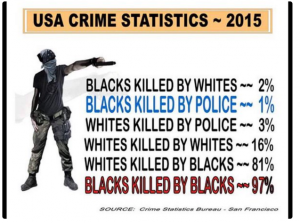Why We’re So Easily Duped (and what to do about it)
Written by Brian Jennings, Posted in Blog, Lead Yourself, Your World
Our gullibility, anger, fear and incessant thirst to win arguments has birthed a hidden industry that slithers around in the cesspool of the Interweb. Will someone please tell me who keeps churning out infographics, memes, emails and stories that are outright lies? Or perhaps the better question is, “Why are people so easily duped?”
A few seconds of research could have informed the duped that Tim Tebow was not really speaking at the Republican National Convention. I can only guess why this rumor was started. Perhaps someone wanted people to lump the RNC in with Christianity in order to garner support or arouse disdain.

A few seconds of research could have informed the duped (including Donald Trump who Retweeted it) that this viral infographic grossly falsified stats and cited a crime bureau that doesn’t even exist. They even tossed in a scary picture of a black man with a gun, just for good measure. The truth is that, when it comes to killings, whites are killed by other whites 82% of the time (not 16% as the graphic says), and whites are killed by blacks 15% of the time (not 81%).* We humans are more apt to kill those in closest proximity to us (which is a whole other problem). Someone is trying to fuel a race war. In fact, it appears that the originator of the image, who lives in the UK, displayed a modified swastika on their Twitter page.
Rumors and lies aren’t a new thing, but 2000 years ago the Jewish leaders didn’t have social media to spread their rumor: “Disciples steal Jesus’ body from tomb.” They would’ve loved the technology to mass-produce their concocted tale.
We must come back to our question: “Why are people so easily duped?” Why would masses of people retweet or share hurtful, dangerous, incendiary lies? Here’s some possibilities:
- They have an agenda. They are on the lookout for anything that bolsters their agenda, and they are so angry that they don’t bother to look for the truth. Their falsehoods prompt the extremists on the others sides to play looser with their facts too. It’s a never ending cycle of doom.
- They are lazy. It’s not too hard to learn that Madalyn Murray O’Haire did not recently launch a legal assault on Christian broadcasters. That rumor is as old as me (41), and O’Haire has been dead for over 20 years, but someone still “alerted” me of her plot just a few months ago. If the duped have time to indulge in crazy rumors, they could probably find the time to do a little research.
- They don’t care about truth. They say they do, but they don’t. They care about themselves, their political party, and their way of life.
- They are prejudiced. How else can you explain the hate-mongering?
- They are gullible and incompetent. Some people just never learn to think with a discerning mind. And others, no matter how many times you explain that there are a million ways to fact-check stories and rumors, only know enough about technology to be dangerous.
- They are easy targets for those wanting to manipulate them. Websites with advertisers get paid per click. Outlandish headlines garner clicks, because duped people can’t resist biting the bait. People profit when the duped click their headline, which means I financially benefit someone when clicking on those luring stories about a lion fighting a crocodile.
So what can we do about it?
- Care about wisdom. The words from James will help: “Be quick to listen, slow to speak [and tweet, email and share on Facebook], and slow to become angry.” Checking truthorfiction (or better yet, multiple places) which research web rumors, will help too. Simply caring about truth and wisdom will put you on the right path.
- If needed, dump your account. If social media causes you to sin in anger and drive a wedge between you and those you ought be most trying to love, get rid of it. “For it is better for your social media to be cast into hell then your whole person” (my paraphrase of Jesus, Matthew 5:29). At the very least, most people would be wise to greatly restrict the amount of time they spend browsing social media.
- Correct falsehoods. If I see someone posting a falsehood, I try to privately let them know they’ve been duped. This gives them the chance to correct it. I appreciate when people privately correct me. Most mature people can handle that. However, if there are already a hundred comments affirming the lie, the person is a repeat offender, or I’m short on time, I may try to gently and publicly comment a correction. This all depends on how well I may know someone.
- Educate yourself. Read thoughtful stuff from people outside of your circle of agreement.
You know what really irks me? It’s when I become one of the duped. Please help me when I am. My trustworthiness matters to my heart, my witness, and our world. Let’s do better, friends. Friends is what we are, right?
*For a more detailed look at some of the crime stats, here are two places that dug for the correct numbers. Click here or here.









Very succinct.
Anything posted should pass two major criteria points:
1/ Is it Inclusive and acknowledge the worth of all
people.
2/ does it promote unity and is non-divisive.
There are other criteria points, but those are the two main ones I look for. Even then I feel a person should continue to research it, to be sure it hasn’t been taken out of context, or being used to divert the reader away fr the fuller picture (so to speak), that the author is commenting on.
Great thoughts!